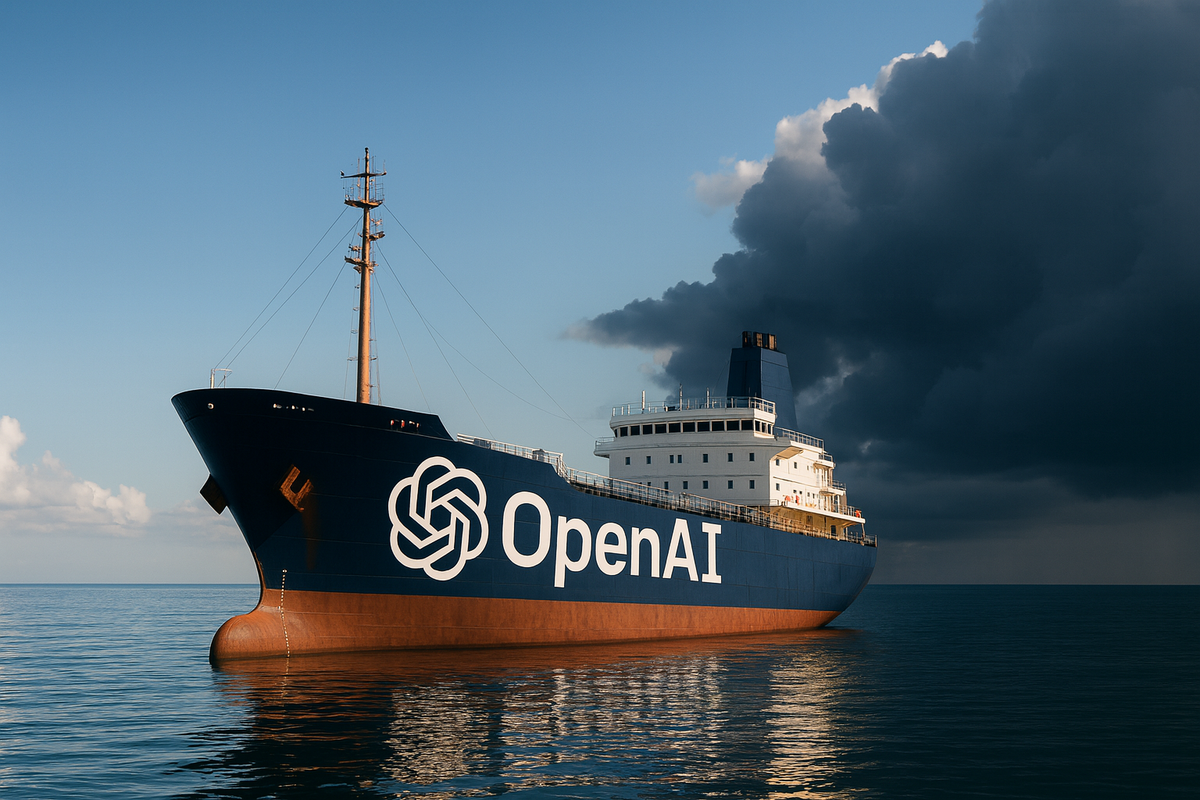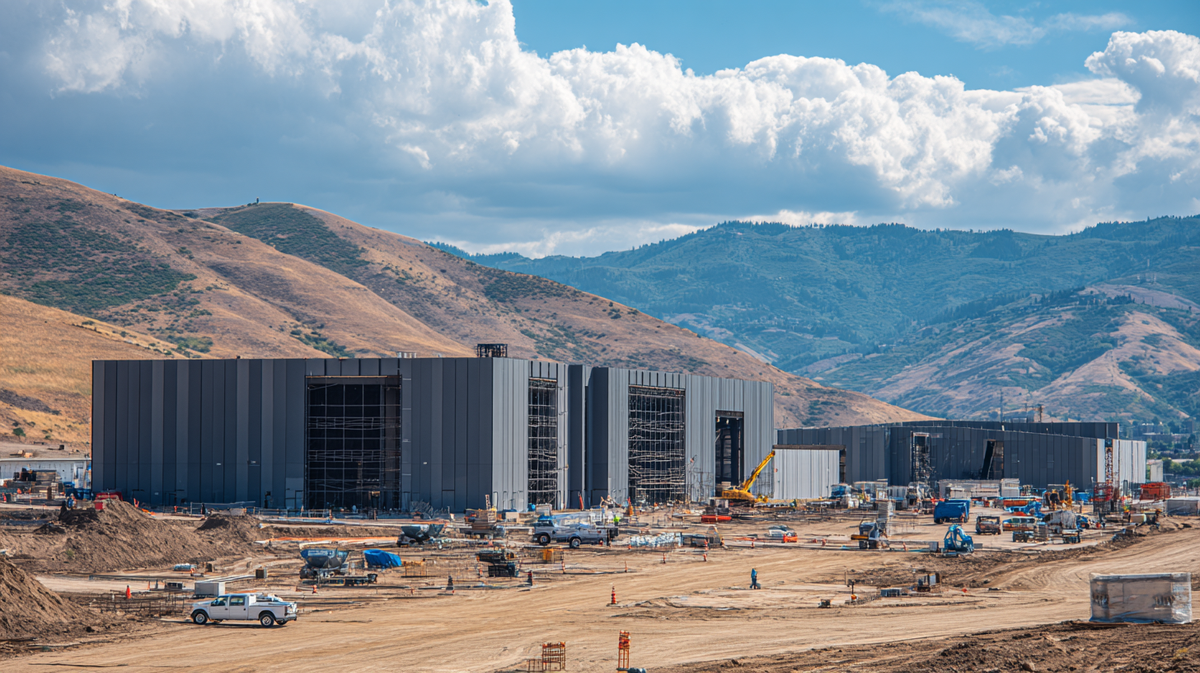AGI or Bust

The world rarely operates in black or white. Most things exist in the margins. In the shades of gray. And yet the world is also increasingly polarized. The loudest arguments right now are either on one extreme or the other. In the tech world this conflict is unfolding around AI. It's either the future of well, everything. Or the biggest bubble ever that's going to burst.
This is not a new debate, of course. We're a few years into it. But the stakes keep getting raised just as the capital continues to be raised. The numbers are truly mind-boggling to the point of being numbing. A year ago, OpenAI was setting a record with a $6.6B fundraise. How quaint. A few months later, $40B was the new high-water mark. Yes, it was more money than has been raised by any company in any IPO ever – and, of course, it wasn't an IPO. But come on, this is AI!
That deal was so nine months ago. How about a $100B deal? Of course! I'm old enough to remember when Apple was in a race with Exxon to become the most valuable company in the world. In 2011, the market cap of both companies was around $400B. Today, OpenAI is worth $500B. As a private company.1
It's silly but it's not particularly funny. And I increasingly do worry that it runs the risk of getting quite serious. Because I believe that OpenAI's strategy here is basically "AGI or Bust". Feel free to substitute in any phrase you'd like for "AGI" there – "Superintelligence" etc – but the idea is the same: that Sam Altman has positioned his company to the point where it now can only work if they achieve "AGI" and it truly does transform well, everything.
And look, that's what they should be aiming for! No one can fault the ambition. The issue is that they've increasingly dragged others along for the ride and those others run the risk of not so much failing as much as collapsing the stock market and thus, the entire economy. That sounds like hyperbole, but again, increasingly, I fear it's not. OpenAI, with their endless ambition, has staged a game to be played on the field that others now simply are being forced to play as well. And games often do have binary outcomes...
To spell it out more plainly, it's not just that OpenAI has massive ambitions, and it's not just that they've convinced investors to give them tens of billions of dollars, it's that increasingly vital parts of the stock market are now completely intertwined in this situation. It started, of course, with Microsoft, which has been working to try to unwind some of that relationship. But as a result, OpenAI has roped in others like Oracle, AMD, and yes, NVIDIA – the largest company by market cap in the world, with a value a full order of magnitude above where Apple and Exxon were all those years ago. It's a stock so vital to the S&P 500 that if it were to tank...
Of course, NVIDIA is a real company with real revenues and unlike OpenAI right now, very real profits. But obviously nearly all of it is wedded to the entire AI ecosystem. An ecosystem which is increasingly wedded to OpenAI. If the company falters, it starts a cascading effect which will absolutely hit NVIDIA. And if NVIDIA falters, it starts a much larger cascading effect which will absolutely hip the entire stock market. And if that happens, things get ugly, fast.
The stock prices and their impacts on 401ks and the like obviously will matter a lot. But just as critical will be the impact such a downturn would have on spending. Without constantly rising stock prices, all of Big Tech will be under immense pressure to stop their wild CapEx spend. Maybe a fully founder-controlled company like Meta can press on, but it will be hard to do it when at least part of the above cascade implies that something about OpenAI's model (if not their models) is broken. That CapEx pull back will impact actual jobs. And if you buy the recent reports that AI spend (specifically, data center build-outs) is the main thing buoying GDP growth in the economy, well...
Again, this gets ugly, fast.
It's all hypothetical, of course, but it's also a bit terrifying as to how quickly and easily it could become reality. It doesn't require the collapse of OpenAI, just something that merely showcases a slowdown in likely outcomes or timetables. Something that puts a chill on spending while sending a chill down the spine of the market. Something that plants a seed of real doubt: maybe this isn't going to play out as promised. This will lead to a private contagion that could lead to a public one.
And again, that's all because OpenAI has set itself up for a completely binary outcome here. With these massive deals, they have bolstered themselves to the point of being "too big to fail". And with that phrase in mind, it's certainly possible that the powers that be in the White House – and certainly the current administration given their proclivity to strike deals with, say, Intel – decide to bail them out or backstop them in some way to stop the above from happening. Then again, I'm not sure we can trust anyone at the Treasury to be savvy enough to see all of this until it's too late...
My point is simply that even something as increasingly polarized as AI really shouldn't be this binary. It is incredible technology that is already transforming things. And it doesn't need to be "AGI" to do that. But again, it feels like OpenAI now needs it to be "AGI" for their own business to work at the scale at which it's being funded. We're literally talking "trillions" here. And that increasingly means that the entire ecosystem is on the "AGI or Bust" train, with everything and everyone so interconnected.
All of this is on my mind when listening to Andrej Karpathy on the Dwarkesh Podcast. Or Paul Kedrosky on Derek Thompson's podcast. Or Azeem Azhar's rebuttal on Derek Thompson's podcast. Or any number of other people on any number of other podcasts. Everyone is dancing around the same campfire. And it sounds increasingly set to the tune of "AGI or Bust" because OpenAI is the DJ.
And it's also on my mind when reading Berber Jin's piece in The Wall Street Journal yesterday reporting on how Altman, almost like the Pied Piper, has been able to get Jensen Huang of NVIDIA and Lisa Su of AMD to line up to dance. They are but two partners in the game of helping OpenAI to come up with some "new ideas" in finance. Some of which sound decidedly less mysterious than than seem simply risky.
As part of the deal, Nvidia is also discussing guaranteeing some of the loans that OpenAI plans to take out to build its own data centers, people familiar with the matter said—a move that could saddle the chip giant with billions of dollars in debt obligations if the startup can’t pay for them. The arrangement hasn’t been previously reported.
I'm highlighting this, in part, because it's well, exactly what I thought might be happening. As I wrote a few weeks ago:
That's where the mysterious "new ideas" for financing come into play. In parsing Sam Altman's provocative words a couple weeks ago, I landed on a model where their massive (up to) $100B deal from NVIDIA is really just a way for a wildly unprofitable startup to be able to access debt to do data center build-outs in the way that only an insanely profitable company – like NVIDIA – can. It's both circular and clever: NVIDIA gives OpenAI cash in exchange for equity, which OpenAI uses to build out data centers, a large part of which is, yes, leasing NVIDIA chips. Those chip agreements are used by NVIDIA to raise cash in the form of debt to send to... OpenAI for these build-outs. And round we go.
OpenAI can't raise the debt required to build their own data centers at scale, but their partner NVIDIA sure can! What could possibly go wrong? At the same time, you can even see the rationale for wanting to do this: Altman must feel like they need to do this in order to beat Google. And certainly Jensen is sympathetic to that argument! Especially with the looming threat of TPUs coming to market...2
Still, Altman would be silly to put all his eggs in one basket. So work continues with Broadcom. And while Lisa Su can't really afford to send OpenAI $100B like NVIDIA can, AMD can do so with stock – certainly if the very deal causes the stock to rise by more than that amount! What can Intel offer? We may see! It's all sort of funny money. But again, not particularly funny. Potentially decidedly unfunny.
Jensen is arguably just as conflicted in all of this as Altman is – more so, in ways, with all of NVIDIA's investments – but he's also more diversified with a real business right now. Not in a decade, today. But again, so much of that business is actually tied up in the music Altman is playing. If that music stops... Jensen knows how that goes. So he really has to be all-in here too. The binary bet. With that in mind, why not pledge $100B?
Especially when he also knows that right now it's sort of the inverse of my doomsday scenario above: all of these AI deals are boosting the stock prices of these companies. You can either play the game or not and be seen as a laggard, one missing out on "free" money. I mean, just look at Oracle. Oracle! All of these deals, even if they currently make no fiscal sense pay for themselves in market cap boosts. Call it vibe investing.
But it all also feels like a race against the clock. Because there's another scenario where OpenAI doesn't bring down the house, but another macro event does and grinds the same gears to a halt. History tells us that's truly only a matter of time. You can't time it, but you can be certain of it. So the race is on to "AGI" before that happens, if nothing else. Which, in turn, is part of what's fueling the massive capital needs and spend right now. Well that and an arms race with Google.
To go back to Jin's story, it feels fitting (and inevitable) that Altman found Masa Son to fuel a lot of this. Everyone knows the stories about Masa asking entrepreneurs to dream bigger and it doesn't get bigger than AI and Altman's ambitions here. It's a bit like a match finding lighter fluid.
Sure, Masa has a history of these types of bets blowing up in his face, and nearly going bust, but perhaps he just didn't latch on to the right idea at the right time. Historically, he's also sort of stumbled into the right ideas on the side which have saved him – Alibaba, ARM, etc – so if he can just align the cash cannon with the right idea...3
Again, it's binary.
So to me, it's less about a bubble that could burst and more about a bet that could bust. The stakes have been bid up to the point where AI simply working at a smaller scale will not be enough here. It has to be "AGI". Perhaps we should simply define it as the technology which creates trillions of dollars in market value. That's what OpenAI – and increasingly the rest of the tech industry, and probably the US economy, and perhaps the entire world economy needs. Because if we don't get that – or even just don't get it on a reasonable timescale... Kaboom.




1 Just ahead of... you guessed it: Exxon, at $480B. ↩
2 And if Altman really was talking to Google about using the TPUs – or even just having the conversation so it might get out there... Well, well played, Sam, it worked! ↩
3 One wild card with all of the above is the foreign money pouring in as well. It could end up as more um, gas, on the fire. Or it could be the um, fuel, that ultimately salvages the whole thing (because the soverign money can better weather any short term fiscal storms, and it's money that still needs to diversify...) But that's all well above my pay grade, but certainly worth noting. ↩



